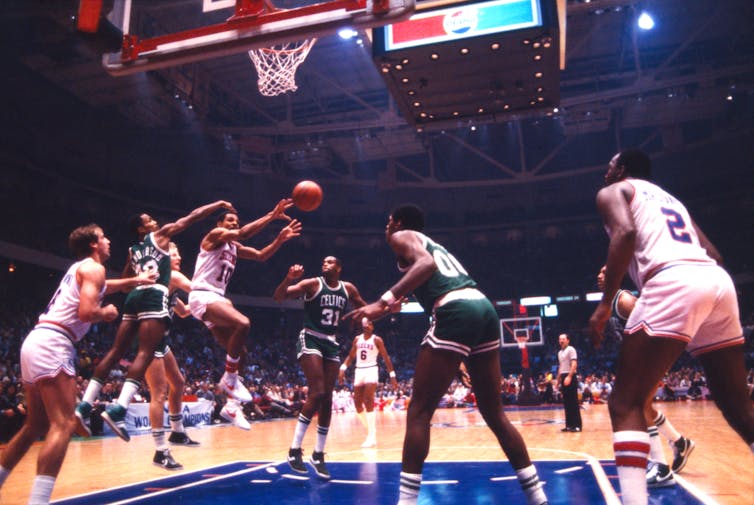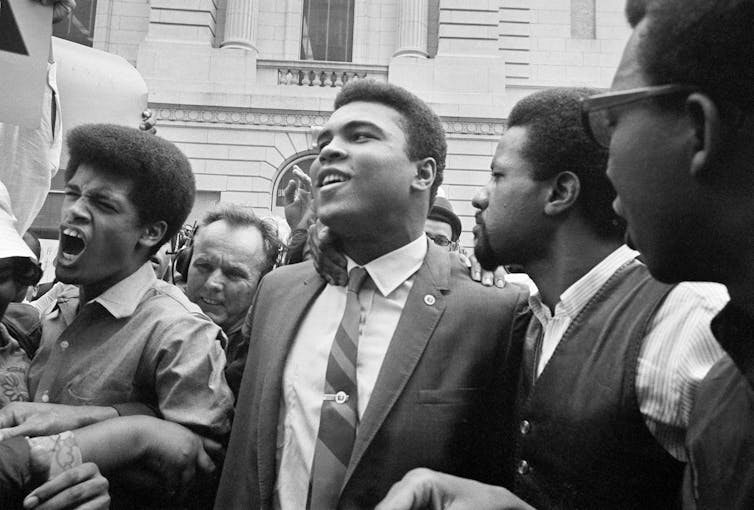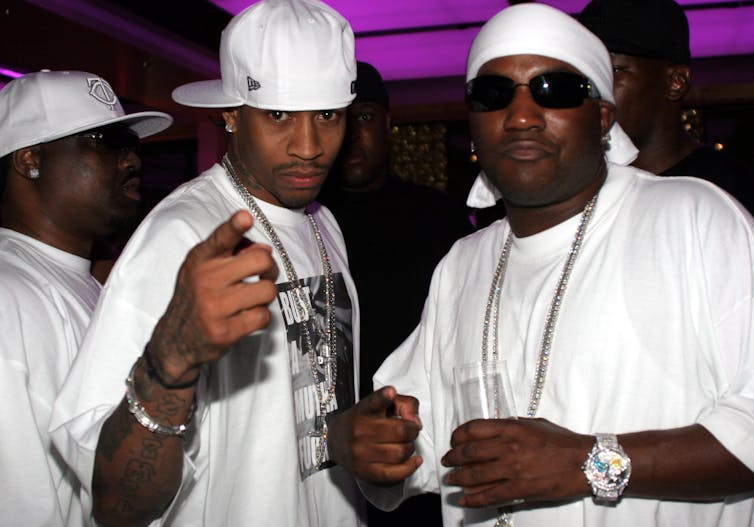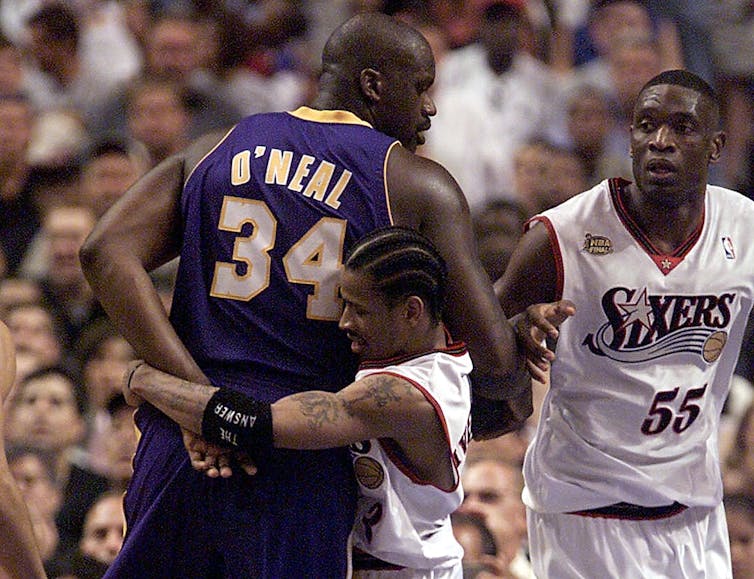Allen Iverson’s 2001 Sixers embodied Philly’s brash, gritty soul − and changed basketball culture forever
- Written by Jared Bahir Browsh, Assistant Teaching Professor of Critical Sports Studies, University of Colorado Boulder
It’s unusual for a professional sports franchise to plan a yearlong celebration for a team that didn’t win a championship.
But it is also rare that a group of players represents the vibe and culture of a city so accurately as the Philadelphia 76ers did back in 2001.
Throughout the 2025-2026 NBA season, the Sixers will honor the 25th anniversary of their legendary 2001 team. The celebration kicks off with the return of Hip-Hop, the muscle-bound rabbit mascot who debuted in 1998 and represented the team for 13 years. Throughout the year the team will wear jerseys and feature court designs from the 2001 season, and it will honor the team and its star player, Allen “The Answer” Iverson, during a reunion game on Jan. 31, 2026.
As a pop culture scholar and director of a program in critical sports studies, I regularly teach about the influence of Iverson, whom I was a big fan of during my elementary school, high school and college years in Philadelphia. I even named my pet guinea pig after the Hall of Fame player.
A new era
The City of Brotherly Love is known for its passionate sports fans. Although this passion has been interpreted by some as aggressive, if not barbaric, Philadelphians’ knowledge of and loyalty to their teams has never waned – even as they endured a 25-year championship drought across their four major professional teams.
Before the Philadelphia Phillies won the World Series in 2008, Philadelphia hadn’t had a championship sports team since 1983. In that year, the Sixers disrupted the dominance of the Boston Celtics and Los Angeles Lakers, who won every other championship from 1980 to 1988.
 The Philadelphia 76ers play the Boston Celtics at the Spectrum on Nov. 19, 1983, in Philadelphia.James Drake/Getty Images
The Philadelphia 76ers play the Boston Celtics at the Spectrum on Nov. 19, 1983, in Philadelphia.James Drake/Getty ImagesThe Sixers remained competitive for a few more years before Moses Malone was traded in 1986 and Julius Erving – “Dr. J” – retired in 1987. In the decade that followed, a contentious relationship developed between fans and Sixers owner Harold Katz. It intensified when Katz traded fan favorite Charles Barkley in 1992.
In 1996, Comcast Spectacor, owner of the NHL’s Philadelphia Flyers, bought the Sixers from Katz and ushered in a new era for the franchise. The team moved to a new arena and hired their former trainer Pat Croce, who had a minority stake in the team, as team president.
That same year, the Sixers won the draft lottery for the first pick of the NBA draft, earning the rights to draft a 6-foot guard from Georgetown University. Iverson not only altered the fortunes of the franchise but became a cultural phenomenon while representing a city known for being brash and gritty.
Policing Black athletes
Black athletes, in particular, are often expected to engage in respectability politics – a strategy in which marginalized people are expected to abandon parts of their own culture to assimilate to the dominant, often white, culture’s expectations. Mostly white team owners and fans want them to act a certain way or avoid speaking out on societal issues such as race.
One of the earliest, and most visible, challenges to this in sports was Jack Johnson, a Black heavyweight boxing champion in 1908 who refused to adhere to social and economic expectations of African Americans in the early 20th century. Johnson taunted his opponents in the ring and flouted his wealth outside of it. Most controversially, he had romantic relationships with white women.
Later, boxing legend Muhammad Ali and Boston Celtics center Bill Russell also faced criticism for speaking out on civil rights issues.
Like Johnson, Ali and Russell were targeted by federal law enforcement. Ali was suspended from boxing for three years for his refusal to join the military and fight in the Vietnam War. Both Ali and Russell were also tracked by the FBI, and Russell found his house in the Boston area vandalized, though no one was charged.
 Heavyweight champ Muhammad Ali leaves the armed forces induction center in Houston on April 28, 1967, after refusing to be drafted.AP Photo
Heavyweight champ Muhammad Ali leaves the armed forces induction center in Houston on April 28, 1967, after refusing to be drafted.AP PhotoIverson, meanwhile, was targeted by the criminal justice system before he even reached the NBA. When he was in high school, he was a top college recruit in both basketball and football even as he navigated poverty and instability.
On Feb. 14, 1993, Iverson was at a bowling alley in his hometown of Hampton, Virginia, when a fight broke out. He and three friends were identified by witnesses, despite questionable evidence that they were involved in the altercation. Iverson was charged with “maiming by mob” – a crime that originally targeted lynching in Virginia. He was found guilty and sentenced to 15 years in prison.
After public outcry and a high profile interview with Tom Brokaw, Iverson was granted clemency and offered the opportunity to play for coach John Thompson at Georgetown University.
AI’s authenticity and style
In the late 1970s some fans and commentators complained the NBA was becoming “too Black,” so in the 1980s the league took a color-blind approach to marketing players such as Michael Jordan and Magic Johnson. Race took a back seat to money, as players of that era largely avoided discussing Black culture.
Once drafted into the NBA, Iverson conveyed an authenticity rarely seen in modern sports, where agents and public relation professionals manage their clients’ image and ensure they say the right things to the media.
He had visible tattoos and began wearing his hair in cornrows in his rookie year. He also embraced rap music and hip-hop culture and style.
 Allen Iverson, center, poses with Atlanta rapper Young Jeezy at the 2005 BET Awards.Johnny Nunez/WireImage via Getty Images
Allen Iverson, center, poses with Atlanta rapper Young Jeezy at the 2005 BET Awards.Johnny Nunez/WireImage via Getty ImagesHis fearless play on the court reinforced this image. He had relentless energy, took challenging shots and put his body on the line.
In Philadelphia, sports fans also appreciated his loyalty to friends and family along with his willingness to speak his mind.
Much like its star player, the Sixers franchise also embraced hip-hop culture, represented in its new rabbit mascot in 1998. Although basketball has had a connection with hip-hop since the 1970s, the NBA’s corporate sponsors were uneasy about this relationship. The Sixers’ decision to lean into this culture was notable.
There was concern, particularly from league commissioner David Stern, that Iverson’s and the Sixers’ embrace of hip-hop culture would alienate certain stakeholders. Stern clashed with Iverson and implemented a league-wide dress code that barred T-shirts, shorts, chain necklaces, sunglasses and even headphones in public appearances. The ban seemed to target the NBA’s young Black players.
Nevertheless, the Sixers attracted new fans and built their team around Iverson’s unique offensive skills, surrounding him with unselfish, defense-focused teammates. They hired Larry Brown as head coach and acquired Philadelphia native and Temple graduate Aaron McKie, who became one of Iverson’s closest teammates.
The 2001 Finals
The Sixers started the 2000-2001 season with a 10-game winning streak and later, after a win against the New York Knicks on Feb. 1, 2001, had a 35-11 record. In a loss on Feb. 7 to the Houston Rockets, center Theo Ratliff injured his wrist and had to undergo season-ending surgery. Over the next two weeks the team won six straight games and Iverson was named the MVP of the 2001 NBA All-Star Game.
Recognizing the need for a big man, however, the Sixers traded four players for top defender and future Hall-of-Fame center Dikembe Mutombo.
As the team adjusted to its roster changes, they stumbled to a 15-11 record in the last 26 games of the regular season, but were still able to earn the top seed in the Eastern Conference. The playoffs consumed the citywith Sixers fever.
Despite its top seed, the team consistently felt like an underdog, reflecting the overall reputation of Philadelphia. Each series was a fight, and the Sixers had to play 18 out of the possible 19 games on their way to the NBA Finals against the Lakers. They escaped elimination games twice.
 Allen Iverson grabs Shaquille O'Neal of the Los Angeles Lakers as Dikembe Mutombo looks on during Game 3 of the NBA Finals on June 10, 2001.Jeff Haynes/AFP via Getty Images
Allen Iverson grabs Shaquille O'Neal of the Los Angeles Lakers as Dikembe Mutombo looks on during Game 3 of the NBA Finals on June 10, 2001.Jeff Haynes/AFP via Getty ImagesGame 1 of the Finals was the defining game of the season. The Sixers battled to an overtime upset, a game known for the “step-over” after Iverson hit a shot and then took an exaggerated step over the Lakers’ Tyronn Lue, who had fallen down while trying to defend the Sixers guard.
The team lost the next two highly competitive games before injuries and the Lakers’ talent proved too difficult to overcome.
Watch the infamous ‘step-over’ at 2:00.A Philly legend
The Sixers have not returned to the Finals since 2001, while both the Phillies and Eagles have since won the World Series and Super Bowl on behalf of the city.
Although Iverson never brought home a championship, and he continued to be polarizing – marked by moments such as his infamous “practice” rant – he still ranks as one of the most popular Philadelphia athletes of all time.
Sixers fans like myself are excited for the opportunity to look back at this team that brought the city together at the start of the new millennium. It’s also a chance to celebrate the future of a team led by an exciting group of guards – Tyrese Maxey, V.J. Edgecombe and Jared McCain – who look to recapture the city and revitalize the legacy of Iverson and the 2001 Sixers.
Read more of our stories about Philadelphia and Pennsylvania, or sign up for our Philadelphia newsletter on Substack.
Jared Bahir Browsh does not work for, consult, own shares in or receive funding from any company or organization that would benefit from this article, and has disclosed no relevant affiliations beyond their academic appointment.
Authors: Jared Bahir Browsh, Assistant Teaching Professor of Critical Sports Studies, University of Colorado Boulder

